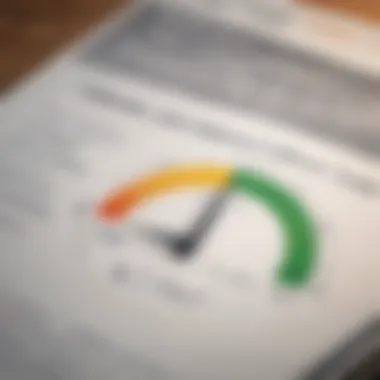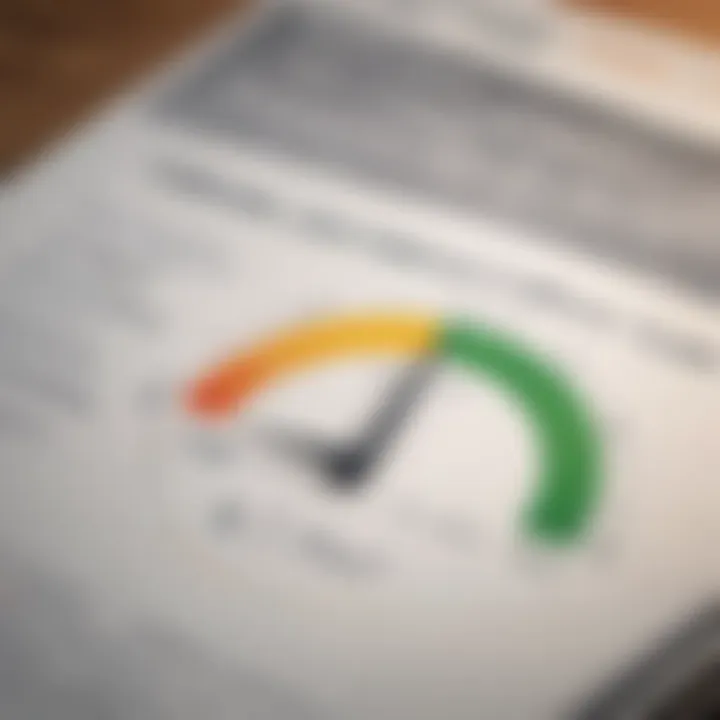Effective Strategies for Reducing Debt Payments


Intro
In today’s financially complex world, managing debt can feel like dodging landmines. Many individuals find themselves in situations where the numbers simply don’t add up, leading to the challenging decision of addressing outstanding debts. It’s a sensitive topic, yet one that deserves our attention. Understanding how to negotiate settlements on debts can save a significant chunk of what you owe, making this discussion vital for anyone dealing with financial strain.
The journeys through debt are often riddled with missteps, uncertainty, and sometimes, buried beneath anxiety. Yet, there’s a light at the end of the tunnel. This article will dive into strategies that not only empower individuals to approach their debts more effectively but also help in uncovering means to pay less than what is owed. Before plunging into the depths of negotiation strategies, a solid grasp of the financial terminology and products involved is essential.
The ability to navigate through various terms, strategies, and implications surrounding debt can be the difference between drowning in bills and regaining financial stability. Your capacity to communicate effectively with creditors, understand your financial situation clearly, and the broader implications on your credit score and future borrowing are all keys to unlocking this complex puzzle.
Let’s embark on this journey and unravel the intricate layers of debt settlement. The first step is understanding the lingo that often clouds these discussions.
Investment Terminology Breakdown
Common Investment Terms Explained
Debt settlement can often lead to numerous misconceptions, especially regarding investment terms that might seem extraneous. However, familiarizing yourself with a few key terms can ease the process significantly:
- Debt: This is the amount of money borrowed and currently owed — understanding this figure helps set the stage for negotiating terms.
- Negotiation: The art of communicate with creditors to adjust the repayment terms in a way that is more manageable for you. This could entail negotiating lower payments or even total debt forgiveness.
- Settlement Amount: This is the reduced figure you aim to pay to fully satisfy the debt. Typically, creditors agree to forgive the difference if you pay this amount in a lump sum.
- Credit Score: This numerical representation reflects your creditworthiness and can dramatically shift based on your financial decisions, including the outcomes from your debt settlement.
Understanding Financial Jargon
When it comes to discussing financial options, both lenders and debtors can toss around jargon that sounds foreign. Here are some terms that will come in handy:
- Original Debt: This is the total amount borrowed, without any accrued interest or additional fees. Knowing this helps in gauging your starting point.
- Creditor: The entity or person that you owe money to. This could be a bank, a credit card company, or even a private lender.
- Hardship: A term often used to describe circumstances that make it difficult for an individual to meet financial obligations. It’s essential when discussing your situation with creditors to see if they can offer more favorable terms.
- Negotiate: The process of reaching an agreement through discussion, especially to adjust debt terms beneficially.
Arming yourself with this knowledge can make a tangible difference in your approach to debt negotiation. Recognizing these terms helps to break down barriers and allows for clearer communication with creditors.
"Understanding the financial terms can turn the tide in your favor, turning a potential battle into a cooperative negotiation."
Pro Tips for Effective Negotiation
Before diving headfirst into negotiations, keep these pointers in mind:
- Do Your Homework: Research your creditor’s policies on debt settlement. Know what similar settlements have looked like.
- Stay Calm and Professional: Emotions can run high during such discussions. Maintaining a level head is crucial.
- Know Your Limits: Have a clear idea of what you can afford when discussing settlement amounts.
- Consider Timing: Connect during off-peak times for creditors, usually early mornings or late afternoons.
As we transition into discussing how to effectively communicate with creditors, it is crucial to remember that preparation can increase your chances of success.
Understanding Debt Settlement
Debt settlement is more than just a financial maneuver; it’s a lifeline for those grappling with the weight of unmanageable debt. In this complex terrain, knowing the ropes can make all the difference between sinking further into financial woes or navigating towards calmer waters. By grasping the ins and outs of debt settlement, individuals are better equipped to lessen their financial burdens and regain control over their economic futures.
Understanding how debt settlement works allows individuals to strategically address creditors in a way that both parties can find acceptable. This knowledge empowers them to negotiate a reduction in the amounts they owe, which can free up finances for other essential obligations or investments. Furthermore, comprehending this process reduces the emotional toll and uncertainty associated with debt, fostering a sense of agency.
Definition of Debt Settlement
Debt settlement refers to a negotiation process wherein a debtor reaches an agreement with creditors to pay a reduced amount toward their outstanding debt. Essentially, creditors accept a lower lump-sum payment instead of the total owed. This process typically occurs when a debtor is in financial distress, and creditors realize they might not recover the full amount owed if the debtor declares bankruptcy or cannot pay at all.
In practical terms, this might involve contacting creditors, discussing one's financial situation, and proposing a settlement offer that represents a fraction of the original debt. Successful settlements, while impactful, can hinge on effective communication and trust-building with creditors, emphasizing the need for transparency throughout the negotiation process.
How Debt Settlement Differs from Bankruptcy
Understanding the distinction between debt settlement and bankruptcy is crucial for anyone considering their options. Bankruptcy is a legal process that provides a discharge of debts, allowing individuals to wipe the slate clean entirely. However, it comes with severe implications for credit scores and the ability to secure loans in the future.
On the other hand, debt settlement allows debtors to negotiate a reduction in their existing debts without going through the legal proceedings associated with bankruptcy. While it can still negatively impact one’s credit score—after all, creditors look upon settled accounts as less favorable—it typically carries lighter long-term ramifications than a bankruptcy would.
In summary, choosing between debt settlement and bankruptcy demands careful consideration of one's long-term financial goals. While both paths can alleviate the burden of debt, the implications of each can shape an individual’s financial future significantly.
"Choosing the right option for debt relief is a pivotal decision that can dictate your financial trajectory for years to come."
By becoming well-versed in the nuances of debt settlement, individuals can make informed decisions, potentially leading to a path of recovery that is less daunting and more hopeful.
Evaluating Your Current Financial Situation
When it comes to settling debt for less than what is owed, taking a step back to evaluate your current financial situation is not just prudent; it is essential. Understanding where you stand financially forms the bedrock upon which all your negotiation strategies should be built. This step is all about clarity and awareness. You can't negotiate effectively if you don't know the specifics of your circumstances. Let’s break it down into two key areas: assessing total debt obligations, and analyzing income and expenses.


Assessing Total Debt Obligations
First things first, you need to lay all the cards on the table by gathering all your debt obligations. This isn’t just about determining how much you owe; it’s about understanding the entirety of your financial landscape.
- Gather Documentation: Collect statements for credit cards, loans, and any other debts. Don’t forget things like medical bills or personal loans from family.
- Identify Interest Rates and Terms: Knowing the interest rates and terms for each debt can offer critical insight. High-interest debts can sometimes be negotiated down more aggressively.
- Categorize Your Debts: Divide your debts into secured and unsecured loans. Secured debts, like mortgages, are tied to an asset, while unsecured debts, like credit cards, are not. This classification can influence how you approach negotiation.
Understanding exactly what you owe will help you argue your case more effectively. If you can demonstrate that your total obligations are overwhelming, creditors may be more willing to negotiate a lower settlement.
Analyzing Income and Expenses
Once you have a firm grasp on your debts, the next step is analyzing your income against your expenses. This will paint a clear picture of your financial health.
- Income Assessment: List all sources of income, including salary, bonuses, and side gigs. It’s crucial to know your total monthly income.
- Expense Tracking: Keep track of all your monthly expenses, from rent and utilities to groceries and entertainment. Knowing where your money goes is vital.
- Calculate Your Surplus or Deficit: By subtracting total expenses from total income, you’ll get a clearer idea of your financial breathing room, or lack thereof. If you’re running a deficit, it’s time to reconsider discretionary spending.
This analysis not only sheds light on your current situation but also provides a narrative for the negotiation process. Credibility hinges on the ability to showcase financial drawbacks transparently, thereby asking for leniency based on your reality.
Remember: A firm grip on your financial situation equips you with the confidence and knowledge needed to negotiate smarter, not harder.
The Art of Negotiation
Negotiation forms the backbone of any debt settlement strategy. It’s more than just a discussion; it’s an art that can significantly influence the outcome of settling debts for less than the owed amounts. Understanding the nuances of communication and preparation can make all the difference when you're sitting across the table from a creditor or a debt collector. Successful negotiations can save you money, time, and hassle, while also helping to preserve your dignity in challenging financial moments.
When approaching negotiation, it’s imperative to maintain a calm and focused demeanor. A cool head enables you to think clearly and make informed decisions on the fly. Moreover, preparation can lay the groundwork for a fruitful conversation. It’s like going into battle fully armed; without the right tools and tactics, you may find yourself on the losing end.
Part of the strategy is understanding the motivations of the creditor or collection agency. They want to recover as much of their loan as possible, but they also realize that collecting a smaller sum is often better than getting nothing at all. This realization opens the door for negotiation. If you walk into a negotiation with a strong game plan and a clear understanding of both your position and the creditor's perspective, you stand a much better chance of reaching a mutually agreeable settlement.
Preparing for the Conversation
Before setting foot into a negotiation, it’s crucial to gather all relevant information. This means pulling together your financial documents, such as income statements and expense reports. Being able to articulate your financial hardship illustrates your situation’s legitimacy. Here are some steps for effective prep:
- List Your Debts: Compile a detailed list of all debts, including minimum payments, interest rates, and total owed amounts. This gives you a clear picture of your financial landscape.
- Set a Target Amount: Determine what you can reasonably afford to offer as a settlement. Research common amounts creditors accept to gain insight into achievable targets.
- Know Your Rights: Familiarize yourself with your rights as a debtor. Being informed about debt collection laws gives you leverage. You can find more about these rights through Wikipedia.
Understanding the dynamics of power in a negotiation can affect the dialogue's tone and progress. Prepare not just to negotiate a reduced amount but also to maintain respect and a level of professionalism, reinforcing that you're approaching this in good faith.
Strategies for Effective Communication
Effective communication during negotiations can sway decisions. It's vital to express your points clearly while also being receptive to feedback. Here are some effective strategies:
- Active Listening: Listen closely to the creditor’s points. This not only shows respect but also gives clues about their willingness to negotiate.
- Use Empathy: Understanding their position can help build rapport. Make statements that acknowledge their concerns, reinforcing a mutually beneficial outcome.
- Be Honest: Disclose your financial struggles transparently. Honesty can foster trust and facilitate better negotiations.
- Stay Calm: Keep your emotions in check. If the conversation becomes heated, take a break. Staying composed demonstrates your confidence and control.
Remember, negotiation isn’t about winning or losing; it’s about finding common ground. Both parties usually have much more to gain through compromise than through contention.
Navigating the treacherous waters of debt negotiation doesn’t need to be daunting. By preparing adequately and communicating effectively, you can approach it with a sense of agency and purpose.
Offering a Settlement Amount
When considering debt settlement, offering a settlement amount is one key aspect that can significantly sway the outcome of negotiations. This process serves not only as a means to potentially reduce what you owe but also as a bridge toward restoring your financial health. The importance of crafting a reasonable offer cannot be overstated; it reflects your understanding of both your financial situation and the creditor's position. In essence, it’s about balancing what you can pay with what might be acceptable to the creditor.
How to Determine a Reasonable Offer
Determining a reasonable offer requires a careful balance of realism and strategy. Start by assessing your total financial situation. Look at your income, expenses, and any other debts you carry. This helps you identify an amount you can realistically pay. Financial advisors often suggest that a good start for negotiations is offering between 30% and 60% of the total owed, depending on your unique situation.
A few guiding principles can aid in defining this offer:
- Research the Creditor’s Policies: Some creditors are more flexible than others. Knowing their track record can provide insights into potential negotiation leeways.
- Timing Matters: If your account is at risk of being sent to collections or close to being charged off, offering a settlement quickly may be advantageous. Creditors want to recover something rather than risk receiving nothing at all.
- Use Competitor Offers as Leverage: If other creditors have settled for a lesser amount in similar cases, this data can be used to support your settlement offer.
Making a strategic offer also involves thinking on your feet. Be prepared for counteroffers, and don't feel compelled to accept the first figure thrown at you. Keep an eye on your financial responsibility and ensure whatever agreement is reached doesn’t stretch your finances but marks a feasible step towards recovery.
Explaining Your Financial Hardship
When presenting your settlement offer, clearly articulating your financial hardship plays a pivotal role in persuading creditors. A well-crafted explanation can turn what might seem like an unreasonable request into a credible plea for understanding.
Communicating your situation doesn’t need to be overly complex, but it should highlight key points such as:
- Job Loss or Income Reduction: If you've faced recent employment challenges or reductions in income, illustrate how this has impacted your ability to meet debt obligations. Provide specifics if possible—like how much your income has dropped and how this directly ties to your financial difficulties.
- Unexpected Expenses: Life can throw curveballs that disrupt even the best financial plans—medical emergencies or significant repairs can take a toll. Detailing these circumstances helps explain your current state without painting a picture of irresponsibility.
- Future Intentions: Let lenders know your commitment to resolving the debt. Emphasizing your desire to settle demonstrates accountability and a willingness to rectify the situation rather than evade it.


A poignant quote encapsulates this sentiment well:
"Honesty is the best policy, especially when negotiating financial hardships. Your truth can resonate with creditors on a human level."
For further reading on financial strategies, you can check out resources on Wikipedia or Britannica. Additionally, forums such as Reddit can offer practical advice from personal experiences.
Understanding the Impacts of Debt Settlement
Navigating the landscape of debt settlement can feel like walking through a minefield, particularly when it comes to understanding its lasting impacts. A successful debt settlement might seem like a breath of fresh air in a suffocating financial burden, but knowing the implications is equally crucial. For individuals hoping to settle their debts for less than what's owed, grasping these impacts is indispensable.
When debts are cut down to size, it’s a double-edged sword. On one hand, the immediate relief of reduced debt can bring a sigh of relief, but the repercussions can echo into the future. Factors like your credit score, potential ability to secure loans, and the overall financial picture need careful consideration.
Before diving into details, it’s worth noting that understanding these impacts can empower individuals to make informed decisions and strategize effectively for their financial futures. As they say in the finance world, what you don’t know can hurt you, and this rings particularly true in the case of debt settlement.
Effect on Credit Score
One of the most immediate repercussions of negotiating a debt settlement is its effect on your credit score. Typically, a settled account shows as settled rather than paid in full. This can act like a red flag to future lenders. Essentially, a debt settlement could lead to a decline in your credit score, at least in the short term. According to the credit scoring models, your score takes into account your payment history and the total amount due, so having a settled debt may not paint a rosy picture.
Here's some specifics regarding this:
- Immediate Score Reduction: Once a settlement is made, the score might dip. This happens because a settled debt often indicates that the borrower was unable to pay the full amount.
- Duration of Impact: The negative effects on your score vary but can linger on your credit report for up to seven years. This could hinder the ability to secure new credit options during that period.
- Resulting Loan Terms: A lower score often translates to higher interest rates or even being denied for loans altogether. Future lenders might view the settled debts as a sign of financial instability.
Ultimately, handling this carefully can make all the difference. While repairing credit is possible, it requires planning, time, and often, patience.
Long-term Financial Consequences
Beyond the immediate credit score implications, the long-term consequences of debt settlement should not be underestimated. Settling a debt isn't just a one-off transaction; it can affect various aspects of future financial health.
- Future Borrowing Capabilities: Many lenders require a robust credit score for approval of new credit. Settled debts could mean that future borrowing becomes a challenge, limiting options for essential purchases like a home or car.
- Increased Interest Rates: Lenders often inflate rates for borrowers with lower scores. This means if you secure a loan post-settlement, the costs associated with borrowing can significantly increase.
- Impact on Insurance Rates: Some insurance companies check credit scores as part of their underwriting processes. A diminished score might lead to heavier premiums for auto or home insurance.
Exploring Professional Help
When confronted with overwhelming debt, individuals often feel like they are swimming upstream against a relentless current. The idea of managing debt can be daunting, but this is where professional help can come into play. Understanding when to seek assistance, especially from debt settlement companies, can be a pivotal moment in regaining control over one's finances. This section explores the nuances of professional assistance, elevating the conversation beyond mere options to a comprehensive look at benefits and critical factors to consider.
When to Consider a Debt Settlement Company
Navigating the troubled waters of debt can be a treacherous endeavor, and it's essential to know when it might be wise to bring someone on board to help steer the ship.
- Overwhelming Financial Burden: If your monthly payments stretch your budget to its limits and you find yourself defaulting on obligations, professional help can become a necessity.
- Lack of Experience: If negotiating with creditors feels like trying to decipher ancient hieroglyphics, it may benefit you to enlist the expertise of a professional.
- Desire for Efficient Outcomes: Engaging with a debt settlement company can save time and peace of mind. They know the ins and outs of the process and have likely struck deals that you may not achieve on your own.
A critical element here is that not every form of debt requires a professional. Debts that feel manageable might still be seasoned enough to cause stress, but they don't always necessitate outside intervention. If you’re already able to handle negotiations, you might want to tackle it solo, at least initially.
Evaluating the Credibility of Professionals
Picking the right professional to assist in debt settlement involves more than just choosing the first name that pops up on a Google search. It’s about performing due diligence and ensuring you’re assigning this important task to a qualified party. Consider the following:
- Research Their Background: Don’t shy away from diving deep into the company’s reputation. Look for reviews on platforms like Reddit or Facebook, where real users often share candid experiences with various debt relief services.
- Check for Credentials: Reputable companies should be registered and certified by organizations specializing in debt relief. This could include the Association of Independent Consumer Credit Counseling Agencies or similar bodies.
- Ask for Transparency: A trustworthy debt settlement company should offer clear terms regarding fees and processes. If they refuse to answer your questions or seem evasive, that’s often a red flag.
- Beware of Upfront Fees: Some companies may demand payment before providing any services. Avoid these companies like the plague—most legitimate firms will charge fees only after they have successfully settled debts.
Legal Considerations
Navigating the terrain of debt settlement is not just about numbers and negotiations; it requires a clear understanding of the legal framework governing these transactions. When tackling debt obligations, knowledge of legal considerations is paramount. This section will highlight the importance of recognizing your rights as a debtor and ensuring compliance with debt collection laws. Grasping these concepts equips you to respond effectively when dealing with creditors and debt collectors.
Understanding Your Rights as a Debtor
As a debtor, you hold certain rights that are designed to protect you from unfair practices by creditors. Firstly, the Fair Debt Collection Practices Act (FDCPA) is a key law that restricts how debt collectors can interact with you. Under this legislation, debt collectors cannot engage in harassment, make misleading statements, or call you at unreasonable hours. Essentially, you have the right to be treated fairly and with respect during the debt settlement process.
Moreover, you are entitled to request written validation of the debt. This means that if you question whether the debt is yours or how much you owe, the collector must provide proof before demanding payment. In essence, knowing your rights not only empowers you during negotiations but also offers a level of protection against potential exploitation.
It's wise to document every communication you have with creditors or collectors. Keeping records of phone calls, emails, and letters can serve as evidence in case of disputes. For a more comprehensive understanding of debtor rights, resources like Wikipedia’s Fair Debt Collection Practices Act can provide greater insight.
Compliance with Debt Collection Laws
Understanding and complying with debt collection laws is equally crucial. It's not just about knowing your own rights; it's about understanding the legal obligations that debt collectors must adhere to. Failure to comply with these laws can result in consequences for the creditor, giving you leverage in negotiations.
For instance, if a debt collector violates the FDCPA by threatening legal action they do not intend to take, you may have grounds to file a complaint with the Federal Trade Commission (FTC) or even pursue legal action against them. This not only reinforces the seriousness of your financial situation but can also potentially lead to a reduction in the total amount owed based on illegal practices.


Moreover, being well-versed in laws like the Telephone Consumer Protection Act and the Fair Credit Reporting Act can help you better navigate your interactions with creditors. These laws protect against unwanted contact and ensure your credit report is accurate, respectively.
By staying informed and holding creditors accountable to the law, you stand a better chance at negotiating a settlement that truly reflects your capabilities. It’s often a tricky road, but an informed debtor is an empowered debtor.
Documenting the Settlement Agreement
When it comes to settling debts, scribbling something on a napkin won’t cut it. Documenting the settlement agreement is essential for both parties involved, providing a clear record of what was agreed upon. It protects you as a debtor and serves as a vital piece of evidence should any disputes arise later. This process might seem tedious, but it safeguards your interests while ensuring your creditors comply with the terms. Not keeping accurate documentation can lead to misunderstandings or, worse yet, a return to the same debt predicament that you worked so hard to escape.
Essential Elements of a Settlement Document
Creating a comprehensive settlement document helps you avoid complications down the road. Here are key components that should always be included in any agreement:
- Identification of Parties: Clearly state who is involved in the agreement—yourself and the creditor. Include names, addresses, and any identifying account numbers.
- Amount Owed and Settlement Offered: Clearly outline the original debt amount and the negotiated settlement offer. Specify the percentage reduction in the debt that’s accepted.
- Payment Terms: Indicate how the settlement will be paid, whether through a lump sum or in instalments, and the due dates for each payment.
- Finality Clause: This is vital. Assert that upon payment, the debt will be considered settled in full, preventing future claims on the same debt.
- Signatures: Lastly, obtain signatures from both parties, including the date of signing. This seals the deal, if you will, making it official.
"In the world of debt settlement, a signed paper is worth more than a promise made."
Safeguarding Your Interests
Once the dust settles, what happens if the creditor doesn't uphold their side of the bargain? That's where proper documentation shines again. Having a well-structured agreement allows you to go back to the original terms in case anything seems off later on. Here are a few ways that these documents can protect you:
- Preventing Double Recovery: You don't want to pay a debt that’s already settled. A documented agreement serves as your receipt, so to speak.
- Legal Recourse: If things turn sour, proper documentation provides the basis for any legal actions you might need to take. It puts you in a stronger position should you need to go to court.
- Records for Future References: Keeping this documentation helps you track past disputes and resolutions, offering insights for future dealings with creditors.
In essence, taking the time to document your debt settlement agreement lays a foundation for peace of mind. Secure it properly, and you can walk away from your debt troubles without looking over your shoulder.
Post-Settlement Steps
After a successful negotiation, where debts have been reduced to a more manageable amount, understanding the subsequent steps becomes critical. These post-settlement strategies can steer an individual towards financial recovery and stability. Ensuring effective management of remaining debt and credit rebuilding are essential components of this phase, for they lay the groundwork for a healthier financial future.
Managing Remaining Debt
Even after settling a portion of debts, there may still be remaining obligations to tackle. It’s crucial to take a calculated approach towards dealing with these surviving debts. Here are a few effective strategies:
- Prioritize Payments: It’s wise to identify which debts accrue the highest interest rates or which ones impact your credit score the most. Paying off these first can minimize overall financial strain in the long run.
- Create a Budget: Realigning your financial plan is essential. A budget should reflect your current income, expenses, and any outstanding obligations. This clarity allows for better forecasting of future spending and saving.
- Maintain Open Communication: If you are unable to make payments on time, reaching out to creditors can be beneficial. Many are willing to work with you, especially if they know you're actively trying to manage your finances. It’s better to address issues proactively rather than letting them escalate.
- Consider Debt Consolidation: This involves combining multiple debts into a single loan, often at a lower interest rate. This can simplify payments and reduce the stress of juggling various creditors.
Taking these actions not only helps manage remaining debt but also enhances one’s understanding of personal financial habits, which can be empowering in the long run.
Rebuilding Credit After Settlement
Recovering from a debt settlement is a gradual process, and rebuilding your credit score is a pivotal aspect of this journey. Here are several steps to facilitate credit restoration:
- Review Your Credit Report: An essential first step is to obtain your credit report and review it for accuracy. Mistakes can happen, and these may negatively impact your score. Disputing errors will help in maintaining a clean record.
- Establish New Credit Responsibly: While it might seem counterintuitive, acquiring a secured credit card or a small, manageable loan can demonstrate responsible borrowing. Paying off the balance each month and avoiding missed payments will gradually improve your credit standing.
- Settle Everything on Time: Regardless of your past, making consistent, on-time payments is critical. Building a positive payment history is one of the most effective ways to elevate your credit score.
- Keep Credit Utilization Low: Aim to use 30% or less of your available credit limit. This metric is significant in credit scoring models.
Remember, it takes time to recover from a debt settlement. Patience and diligence are key.
By actively engaging in these practices, individuals can not only mend their credit scores but also instill better financial habits that serve them well into the future. The path post-settlement may seem daunting, but with the right strategies, a brighter financial outlook is entirely achievable.
Real-Life Case Studies
Real-life case studies serve as invaluable resources when navigating the often murky waters of debt settlement. They present real situations, offering readers a comprehension of both the possibilities and the pitfalls involved in negotiating debt reductions. Understanding these case studies helps individuals identify strategies that might work in their own unique situations, adding practical insights to theoretical knowledge. Through actual accounts, readers can comprehend the nuances of each scenario and grasp how different approaches yield varied outcomes.
The benefit of examining case studies lies in their capacity to illustrate the fine line between success and failure. Each case unravels the importance of preparation, timing, and communication—all crucial elements that can sway negotiations in one direction or the other. Furthermore, they can illuminate the emotional aspects of going through such processes, shedding light on how stress and anxiety can influence decisions. Having knowledge of how others have handled similar situations can empower readers to take proactive measures.
Successful Debt Settlement Examples
In the realm of debt settlement, success stories often emerge as a beacon of hope. For instance, let’s consider the case of Sarah, a mid-level marketing manager burdened with credit card debt amounting to $30,000. After a financial setback, she sought aid in renegotiating her debt. Armed with an exhaustive understanding of her finances, she set out to communicate with her creditors.
- Preparation: Sarah analyzed her monthly budget meticulously, noting her income and essential expenses. This valuation portrayed her true financial standing and permitted her to propose a settlement that, while less than what was owed, was reasonable according to her circumstances.
- Negotiation: During negotiations, Sarah maintained a calm demeanor. She clearly explained her hardships while illustrating potential future payments if her debt were reduced. Eventually, she succeeded in reducing her debt to $15,000, representing a staggering 50% reduction.
This successful example not only highlights the viability of debt settlements but also underlines the power of communication and understanding one’s financial landscape.
Lessons Learned from Unsuccessful Attempts
Not every case leads to a favorable outcome; in fact, some individuals find themselves further entangled in their financial woes. Take the case of John, a business owner whose debts had ballooned to $50,000 after a series of failed ventures. Eager to lessen his financial strain, he hastily agreed to a settlement without fully assessing his ability to negotiate or understand the ramifications.
- Lack of Research: John approached his creditors without adequate preparation, ultimately accepting an offer that was unfavorable. He didn’t dive deep into the terms or consider other options available to him.
- Emotional Decisions: Driven by anxiety and desperation, John's rush in accepting the initial offer cost him dearly. The emotional toll clouded his judgment, leading him to overlook critical strategies for negotiation.
As a result, not only did he miss the opportunity to secure a better deal, but he also faced subsequent legal consequences due to his inability to honor the new terms. His experience drives home an essential lesson: rushing into decisions can often lead to regrettable outcomes. Understanding the nuances and taking time to analyze one’s situation is critical in debt negotiations.
"Preparation and patience are the two pillars of successful debt negotiation."
Through the lens of real-life examples, readers can glean insights and strategies that resonate deeply, advancing not only their understanding of debt settlements but also their capacity to navigate their own situations with greater confidence and efficacy.







